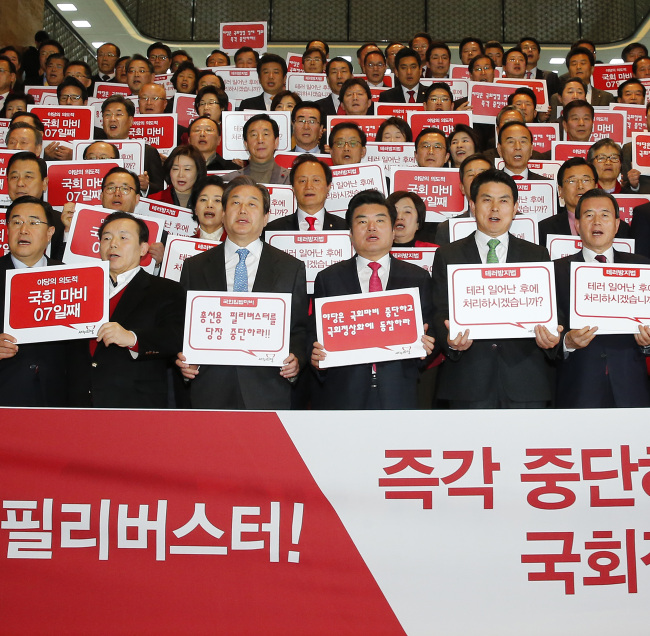The rival parties on Monday collided over the ongoing opposition filibuster, with the ruling party threatening legal action and adding pressure to suspend the 140-hour debate so that imminent bills, including the new electoral map can be passed.
The bill on new constituencies for the April 13 general election passed the public administration committee late Sunday to be put up for a plenary vote on Monday.
Feeling the pressure, The Minjoo Party of Korea asked for a brief recess in its filibuster against antiterrorism bills to vote on the delayed election bill. The party’s whip Rep. Lee Jong-kul said they are willing to temporary halt the filibuster to pass the election bill.
 |
| Saenuri Party lawmakers hold up placards to protest aganist the opposition-led filibuster at the National Assembly. (Yonhap) |
“It is not appropriate to say that we face an ‘either or situation’ when we have an alternative procedure,” Lee said, arguing that political parties can hold a plenary session amid filibustering and continue the obstructive procedure afterwards.
But the Saenuri Party refused to accept the call, claiming that it is “legally impossible” to hold the session unless the Minjoo Party stop filibustering. The Assembly law stipulates that a filibuster can end only when there are no filibusterers and there is three-fifths approval of the attending lawmakers, when the session ends on March 11.
“In terms of law, the opposition party’s request to halt the session and pass the election law does not make sense. They have to stop filibustering and adjourn the current session,” said Rep. Kim Jung-hoon who chairs the party’s policy committee.
Kim also suggested that the filibustering was “null and void” when the National Assembly Speaker Rep. Chung Ui-hwa vacated his seat on Saturday after being exhausted by the marathon speech session. Parliamentary committee chairpersons have overseen the session, alternating back and forth amongst them.
The Saenuri Party also threatened to file a defamation suit against some claims made during the filibusters, claiming the opposition lawmakers have made false accusations against the National Intelligence Service, the nation’s top intelligence agency. While the lawmaker is subject to immunity, false accusations made outside the parliamentary hall can be legally disputed, the Saenuri said.
“Opposition lawmakers argue that if the counterterrorism bills are passed, the NIS are able to listen in on the peoples’ telephone conversation and spy on mobile messenger. It is false rumor and undermine the NIS reputation,” said Kim.
The Minjoo Party lawmakers argues that the bill would curtail civil liberties by allowing what they consider to be an unreliable intelligence agency to have unauthorized access to private information, such as phone records and financial statements.
The main opposition asserts that the bill should include clauses preventing the authorities from infringing upon civil rights. They said that the law should ban the National Intelligence Service from having the authority to track down and interrogate terror suspects. Instead, the authority should belong to the counter-terrorism center built by the government.
President Park Geun-hye and the Saenuri Party have insisted that the security bill which aims to enhance the intelligence agency’s surveillance capabilities should be passed to address terror threats such as those from North Korea and international terrorist organizations such as the Islamic State group.
By Yeo Jun-suk (jasonyeo@heraldcorp.com)

